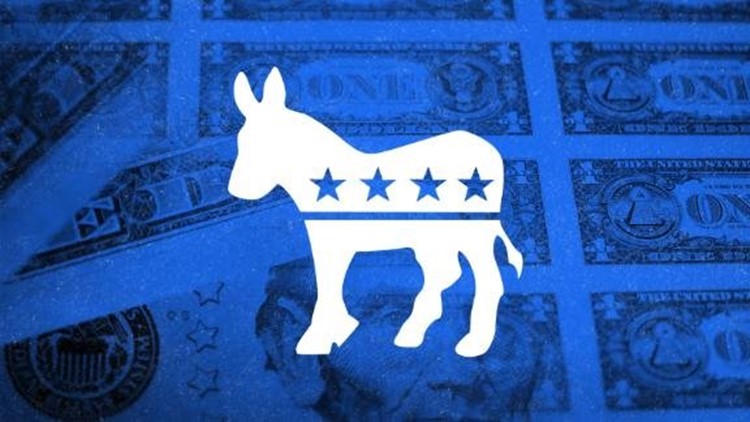(CNN) — President Donald Trump’s massive fundraising operation makes him a formidable candidate in the 2020 race for the presidency, and new campaign-finance reports out this week from the Democrats hoping to oust him underscore their grueling task ahead.
Some key takeaways from the first-quarter fundraising reports:
An early start pays dividends for Trump
Trump’s fundraising underscores a key point: He’s a candidate like no other.
Trump’s decision to kick off his re-election early — he filed the paperwork the day he was sworn in — means he has raised far more money than his predecessors at this point in their presidencies.
And he shows no sign of slowing down.
The $30.3 million his campaign brought in during the first three months of the year, marks the strongest fundraising quarter for Trump since he entered the White House. Add in the money available to the Republican National Committee and an affiliated fundraising operation, and Team Trump said it began April with more than $80 million available cash in the bank — months before Iowa Democrats kick off their party’s nominating process in February.
A protracted battle for Democrats
The crowded, and growing field, of Democratic candidates faces a long slog to the nomination.
There’s an early top tier in fundraising — Vermont Sen. Bernie Sanders, California Sen. Kamala Harris, former Texas congressman Beto O’Rourke and South Bend, Indiana, Mayor Pete Buttigieg — but no one came close to Trump’s haul.
Many of the early contenders are struggling to compete for dollars.
Of the 16 Democratic candidates who filed first-quarter reports with the Federal Election Commission, half raised $3 million or less from donors in the first three months of the year. That includes New York Sen. Kirsten Gillibrand, former Colorado governor John Hickenlooper, Washington Gov. Jay Inslee, and former Secretary of Housing and Urban Development Julian Castro.
It’s a sign that Democratic donors haven’t yet coalesced behind the contenders, said Anthony Corrado, a campaign-finance expert who teaches at Colby College in Maine. “It’s a huge field of not very well-known candidates.”
Hey, big spenders
A slew of candidates relied on leftover Senate funds to sustain their early operations, but it could be a fast-diminishing source of money.
Massachusetts Sen. Elizabeth Warren, for instance, raised $6 million from donors during the January-to-March fundraising quarter and spent almost all of it, more than $5.2 million. But her massive Senate war chest allowed her to transfer $10.4 million to her presidential campaign.
She needs that cushion.The two-term senator famed for her consumer advocacy has sworn off high-dollar fundraising. But Warren also has built a big campaign operation in the early states and already employs 170 people. Her top expense during the first quarter: staff at $1.2 million, or nearly $1 out every $4 she spent.
Gillibrand also transferred a big sum, moving $9.6 million from her Senate coffers.
She also spent heavily, burning through $2.4 million during the first quarter after raising just $3 million from donors.
Small-dollar test
Sanders, who built a massive progressive following during his 2016 presidential campaign, leads the field not just in overall fundraising but in the proportion of his money that came from small-donors. The latest figures show that 84% of Sanders’ individual contributions came from donors who gave $200 or less to his campaign, providing him key grassroots support for the long haul.
In second place, businessman Andrew Yang at 81%. Yang has relied on the “Yang Gang,” an enthusiastic group of online supporters who like his idea of giving Americans a universal basic income of a $1,000 a month. And those small donors helped Yang met the 65,000-donor threshold for early Democratic debates.
The Democratic National Committee’s new debate criteria — meet polling thresholds or show small-donor support — has inverted traditional fundraising, Corrado said. In previous campaigns, candidates raced to line up big donors and influential fundraisers who could tap their relatives, friends and associates for cash.
In the 2020 contest, he said, “the first hurdle isn’t necessarily raising the most money, but reaching the donors you need to qualify for the debate.”
Money in the bank
Heading into the second quarter of 2019, Sanders is in a commanding financial position with about $26.6 million in cash on hand available across his 2020 committee, his Senate campaign committee, and leftover funds from his 2016 presidential campaign. Over $15.6 million of that is parked in his presidential campaign.
Warren has the second most cash on hand with $11.2 million in her presidential campaign account, largely the result of a $10.4 million transfer from her Senate campaign account, and leaving just under $300,000 available there. Gillibrand also benefited from a large transfer of Senate funds, entering Q2 with just under $10.2 million in her presidential campaign account and about $650,000 left in her senate account.
Sanders, Warren, and Gillibrand had by far the most available in their Senate accounts to transfer to their presidential campaigns, but other candidates built up sizable cash on hand reserves on the strength of strong first quarter fundraising. Buttigieg, who raised just under $7.1 million, only spent a little over $685,000 in the quarter and has $6.4 million entering Q2; Harris ended the quarter with just under $9 million in cash on hand, a little under $55,000 left in her Senate account; and O’Rourke ended with a little over $6.8 million in cash on hand. John Delaney ended the quarter with nearly $10.6 million in cash on hand, almost entirely the result of contributions and loans he made to his campaign from his personal fortune. And Julian Castro ended the quarter with just over $625,000 in cash on hand, raising questions about the long-term viability of his White House bid.



